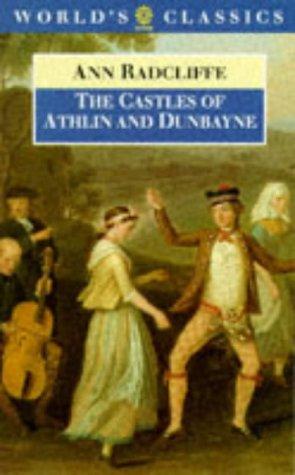POEMS AND E-TEXTS
Radcliffe's
poems were collected into an edition in 1816, under the title The Poems of Mrs.
Ann Radcliffe (London: Printed by and for J. Smith, 1816), 118 pp. This
electronic edition seeks to collect together all of the poems featured in her
novels; the grouping, therefore, covers the 1816 edition and adds to it a few
poems not featured in that edition. As Radcliffe's poetical work in her heyday
always worked within her novels, this electronic collection also seeks to put
each poem back into its fictional context.
Poems from The Castles of Athlin and Dunbayne (1789)
(LONDON: T. HOOKHAM, 1789)
Castles of
Athlin and Dunbaye (London: T. Hookham, 1789), 77-78: "As he was one day
standing at the grate which looked upon the castle, observing the progress of
these birds, his ear caught the sound of that sweet lute whose notes had once
saved him from destruction; it was accompanied by the same melodious voice he
had formerly heard, and which now sung [PAGE 78] with impassioned tenderness
the following air:
When first the vernal morn of life, Beam'd on my infant eye,Fond I survey'd the smiling scene, Nor saw the tempest nigh, Hope's bright illusions touch'd my soul, My yound ideas led;And Fancy's vivid tints combine'd, And fairy prospects spread. My guileless heart expanded wide, With filial fondness fraught;Paternal love that heart supplied With all its fondness sought. But O! the cruel, quick reverse! Fate all I lov'd involv'd;Pale Grief Hope's trembling rays dispers'd, And Fancy's dreams dissolv'd." Castles of Athlin and Dunbaye (London: T. Hookham, 1789), 92-4: "The parting sun trembled [PAGE 93] on the tops of the mountains, and a softer shade fell upon the distant landscape. The sweet tranquility of the evening threw an air of tender melancholy over his mind; his sorrows for a while were hushed; and under the enthusiasm of the hour, he composed the following sonnet, which, having committed it to paper, he the next evening dropped upon the terrace. SONNET. Hail! to the hallow'd hill, the circling lawn. The breezy upland, and the mountain stream!The last tall pine that earliest meets the dawn, And glistens latest to the western gleam! Hail! every distant hill, and dowland plain! Your dew-hid beauties Fancy oft unveils;What time to Shepherd's reed, or Poet's strain, Sorrowing my heart its destin'd woe bewails. Blest are the fairy hour, the twilight shade Of Ev'ning wand'ring thro her woodlands dear;Sweet the still sound that steals along the glade; 'Tis Fancy wafts it, and her vot'ries hear. [PAGE 94]'Tis Fancy wafts it!--and how sweet the sound! I hear it now the distant hills uplong;While fairy echoes from their dells around, And woods and wilds, the feeble notes prolong!"
Castles of Athlin and Dunbaye (London: T. Hookham, 1789), 227-30: "In a
gallery on the North side of the [PAGE 228] castle, which was filled with
pictures of the family, hung a portrait of Mary. She was drawn in the dress
which she wore on the day of the festival, when she was led by the Earl into
the hall and presented as the partner of Alleyn. The likeness was striking, and
expressive of all the winning grace of the original. As ofte as Alleyn could
steal from observation, he retired to this gallery to contemplate the portrait
of her who was ever present to his imagination: here he could breathe that sigh
which her presence restrained, and shed those tears which her presence forbade
to show. As he stood one day in this place, wrapt in melancholy musing, his ear
was struck with the notes of sweet music; they seemed to issue from the bottom
of the gallery. The instrument was touched with an exquisite expression, and in
a voice whose tones floated on the air in soft undulations; he distinguished
the following words, which he [PAGE 229] remembered to be an ode composed by
the Earl, and presented to Mary, who had set it to music the day before.
MORNING. Darkness! thro thy chilling glooms, Weakly trembles twilight grey;Twilight fades--and Morning comes, And melts thy shadows swift away! She comes in her Aetherial car, Involv'd in many a varying hue;And thro' the azure shoots afar, Spirit--light--and life anew! Her breath revives the drooping flowers, Her ray dissolves the dews of night;Recalls the sprightly-moving hours, And the green scene unveils in light! Her's the fresh gale that wanders wild O'er mountain top, and woodland glade;And fondly steals the breath, beguil'd, Of ev'ry flow'r in ev'ry shade. [PAGE 230]Mother of Roses!--bright Aurora!--hail! Thee shall the chorus of the hours salute,And song of early birds from ev'ry vale, And blithsome horn, and fragrant zephyr mute! And oft as rising o'er the plain, Thou and thy roseate Nymphs appear,This simple song in choral strain, From rapturing Bards shall meet thine ear. CHORUS. Dance ye lightly--lightly on! 'Tis the bold lark thro' the air,Hails your beauties with his song; Lightly--lightly fleeting air!"
